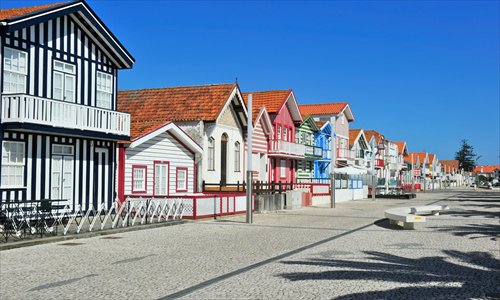HOME >> BUSINESS
Ticket abroad
Source:Agencies Published: 2013-12-4 23:28:01

Houses in Aveiro, Portugal in 2012 Photo: AFP
A dream home in Portugal is becoming a golden ticket for wealthy Chinese, as property assets can also yield a prized residence permit, allowing them to travel and do business across Europe.
Portugal is rolling out the red carpet to discriminating Chinese buyers, who in turn are helping to stabilize property prices, which have dropped by nearly one third during a deep recession that has accompanied the country's international bailout.
Government program
One year ago the Portuguese government launched a program to attract wealthy investors, and the results are now beginning to bear fruit.
For the purchase of a home or apartment of at least 500,000 euros ($700,000) which is to be kept for at least five years, investors will receive a Portuguese residence permit.
Only obliged to spend seven days per year in Portugal, the holders of these residence permits may travel and work throughout Europe without a visa within the Schengen area countries.
Under the new visa law, the purchase money has to be transferred to a local bank and its origin explained to the Bank of Portugal to prevent money-laundering.
Residence permits are only extended as long as property of the same value remains in the hands of the same person. Buyers also face normal local property taxes.
Chinese account for the overwhelming majority of investors in the scheme, followed by Brazilians, Russians and Angolans.
The scheme is similar to those in place in a number of other European nations, and data released last week by the Portugese foreign ministry showed that 356 of the residence permits issued so far have brought 222 million euros in investment.
Now that the program is up and running, the increase in investment is expected to be swifter, said Luis Lima, head of the Portuguese real estate agent association.
More than 300 new requests for permits are under review, which would take the total investment to 600 million euros, he estimated, and "the requests are almost always accepted," he said.
In a single week last month, 15 million euros was invested, according to Portuguese government figures, a rate that, if sustained, would take annual investment to nearly 800 million euros.
Meanwhile, companies are adapting to the rich newcomers. Lisbon real estate agency Casa em Portugal hired Yansi Xu solely to better serve Chinese clients.
"They are almost all businessmen. I have sold them seven houses in two months," said the 34-year-old, taking a break from tapping frenetically at his computer.
One client is a 35-year-old businessman who with his wife plans to move into a modern apartment near the Luz stadium in Lisbon's Benfica neighborhood, so that their young son can go to an English-language school in Lisbon.
The Chinese education system is "too demanding" for the child, Lima said, so the parents would prefer him to be educated in Europe.
Another advantage, said the realtor, is space.
Chinese buyers are attracted by city and holiday property outside their own overpriced market, where they cannot hold land rights indefinitely, as a means to diversify their assets.
"For 500,000 euros clients can buy an apartment with four rooms at 130 square meters in Lisbon, while in Beijing or Shanghai that is the price of a two-room space of 60 square meters," he said.
Chinese investors are also taking advantage of the yuan's strength against the euro, according to the Hispanic-Chinese Business Council.
Gateway to Europe
Most Chinese investors do not aim to make Portugal their home, but want to use the visa to conduct business in other European countries, which they can visit freely within the Schengen area of 26 countries, which excludes Britain and Ireland.
"As a general rule, Chinese buyers are looking for new or renovated homes that they can rent out at a higher rate," said lawyer Raquel Cuba Martins, whose firm helps Chinese clients navigate Portuguese bureaucracy.
There are two other ways of obtaining a "golden visa": investing a million euros ($1.36 million) in Portugal or creating 10 new jobs for its economy.
But the property route, says Martins, is by far the most popular, with around 80 percent opting for it among her clients.
Outside the capital, Chinese investors are also attracted by property in Cascais, a seaside resort town near Lisbon, and houses on the southern Algarve coast.
Offices on the Avenida de Liberdade, equivalent to the Champs-Elysees in Paris, are also highly sought-after, with prolonged haggling over the price an expected part of the exchange.
"Golden visas now represent 20 percent of our sales," said Valdemir Lopes, commercial director at the estate agency ERA Expo, which offers apartments in the ultramodern Parque das Nacoes complex in Lisbon.
The country has enacted a series of austerity measures including painful job, pension and salary cuts in order to receive funds agreed on with the EU and IMF in May 2011 as part of a 78-billion-euro rescue plan.
The country's economy has contracted by more than 4 percent since the crisis began, with property prices declining by some 30 percent.
Agencies
Posted in: Insight